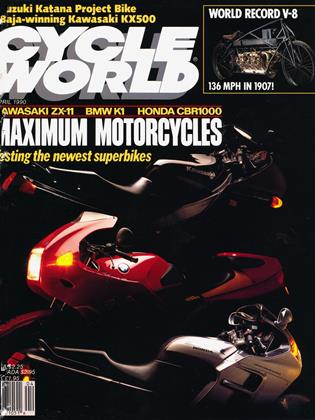Michelin Pulls Out of U.S. Bike-tire Market
ROUNDUP
PLANNING ON REPLACING THE tires on your bike with Michelins? Better hurry. Michelin Tire Corp. announced in late December that it will depart the U.S. motorcycle aftermarket-and racing-tire business.
Michelin Product Information Manager Tom Vaughan said the company, which builds its motorcycle tires overseas, does not have the production capacity available to continue building tires to send here.
Michelin, operated from its headquarters in central France by the grandson of one of the two brothers who founded it a centurv aao. is expected to become the largest tire maker in the world if its planned $1.5 billion takeover of Uniroyal Goodrich is approved by U.S. autho0rities. The company would then have about 20 percent of the global tire market and sales of about S 10.3 billion.
The company, so highlv secretive that its executives reportedly once allowed a factory to burn down rather than let firemen into the plant, declined to provide Cycle World with its motorcycle tire sales statistics. But Bob Gregg, president of Metzeler Motorcycle Tires, which as of January 1 also began distribution of Pirelli motorcycle tires, said his company’s studies indicate that Michelin sales totaled just five percent of the U.S. street-tire market, or 50.000 to 60,000 tires per year.
The motorcycle street-tire sales leader here, Gregg said, is Dunlop, with about 35 percent of the market, followed by Metzeler. with about 30 percent of the market.
“There’s no clear number-three tire, and there's not much (market share) there for the rest of the guys. You have to have a break-even point, and that's substantially above 50.000 pieces, so certainly, Michelin's return on its investment was negative,” explained Gregg.
The variety of sizes and compounds in which any motorcycle tire must be offered adds great complexity to an already-difiicult market. Gregg added. He pointed out that w here 10 years ago, each company offered a basic street tire, there now exist six or seven street-tire market segments.
“If you don't have a 20-percentplus market share, it's hard to justify making new’ molds for new sizes, compounds and construction techniques. You can't afford to do it. So this (Michelin's departure) is no badge of dishonor, it’s just good business,” Gregg explained.
Michelin’s decision hit race-tire distributors especially hard. Said Tim Smith, of International Cycle Racing Tires, one of several national distributors that service club roadracers, “I’ve had lots of calls. (The racers) are as at sea about it as we are. If we can't get the product, we're out of business.”
National-level teams, such as Yoshimura, serviced directly by Michelin, also have been shaken by the Michelin pullout. Said Yoshimura's Dave Wolman. “We're trying to do a deal with Michelin France. If we can't, we’ll just have to find another source of tires. I don't think we're going to be sponsored by Dunlop."
Vaughan stressed that while his company - has left the aftermarketand racingtire markets, owners of bikes originally equipped with Michelins—Suzuki GSX-Rs and certain Ducatis, for example—will be able to get replacement tires “through normal channels,” presumably local dealerships.
Jon F. Thompson














